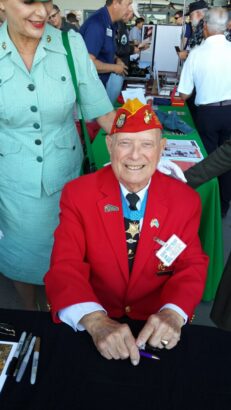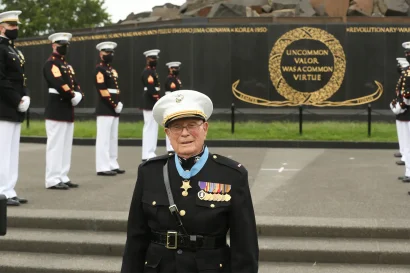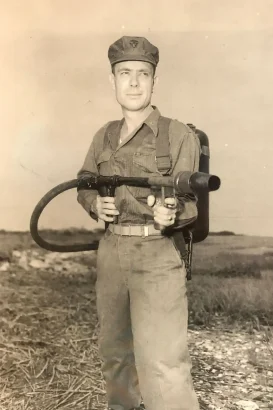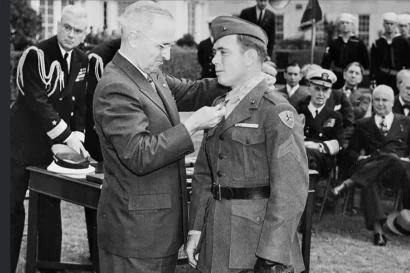Woody Williams, the last WWII Medal of Honor hero who fought to preserve America’s freedom
by Heather Robinson

From The New York Post

Photo: David Bifano
With the death last week of Hershel “Woody” Williams at 98, America lost its last surviving World War II recipient of the Medal of Honor, the US military’s highest decoration for valor in combat.
A Marine, Williams fought in the Battle of Guam, then the Battle of Iwo Jima, where he helped clear a path for fellow Marines to secure the island, a turning point in the war memorialized in the iconic photo of the flag-raising there.
While many Americans recognize that photo, most can’t imagine the hardships endured by the Marines battling a fanatical enemy for five weeks in some of World War II’s bloodiest combat.

Hershel W. “Woody” Williams bravely fought in the bloody Battle of Iwo Jima in World War II. U.S. Marine Corps / Sgt. Jason Kolela
Born the youngest of 11 on a dairy farm in Quiet Dell, W. Va., Williams was initially rejected for military service because at 5’6” he didn’t meet the (later-revised) height requirement, but eventually trained at San Diego’s Camp Pendleton in demolition and flamethrowers.
On Iwo Jima, Japanese fire from reinforced-concrete pillboxes slaughtered waves of Marines trying to secure the island, key to bombing missions over Japan.
After days of intense fighting, Williams’ desperate commanding officer asked him to use his flamethrower to take out the pillboxes. “I’ll try,” the 21-year-old responded.

Hershel W. “Woody” Williams, then 21 years old, relentlessly burned down seven pillboxes and cleared territory for American infantry.
For over four hours, Williams singlehandedly destroyed seven pillboxes and vanquished enemy soldiers attacking him with bayonets in hand-to-hand combat, repeatedly returning to his headquarters to refuel — and battling on. With support from fellow Marines, two of whom were killed, he cleared a path for American tanks and armored vehicles.
For his courage, Williams received the Medal of Honor from President Harry S. Truman on Oct. 5, 1945.
In an interview last year, Williams said he never doubted they’d succeed. “Did I have fear? Yes, but courage is stronger than fear, and if we had let fear take over, we’d have been done . . . When I saw others be courageous, I couldn’t help but be courageous.”
Through it all, he never lost his humanity.
“We had been taught all our lives by parents and teachers that taking a life is absolutely wrong, but you find yourself in combat and there is no choice, it is you or them. To have to take lives — of course, it has an impact. I fought the demons for over 20 years.”
After the war, Williams worked for 35 years as a Veterans Affairs counselor, dedicating himself to his family and fellow service members, and also ran a horse farm, his grandson Brent Casey of Huntington, W. Va, said.
Nearly 20 years ago, Casey, who himself served in Operation Desert Storm as an Army medic, was struggling as a “homeless, jobless alcoholic deep in PTSD” in Lexington, Ky., when his grandfather came to his rescue.

President Harry S. Truman awarded the Medal of Honor to Cpl. Hershel ”Woody” Williams in October 1945. Courtesy of Hershel Williams Medal of Honor Foundation
Williams “was the stiff hand that got me to the VA,” recalled Casey. “He got me to understand what PTSD was and that there are ways to cope.”
Ten years ago, Williams co-founded the Woody Williams Foundation (Woodywilliams.org) with his grandsons Brent and Bryan Casey. The foundation has dedicated 103 monuments across the country to “gold star” American families — those who “gave their loved ones for the freedoms we enjoy every day,” as Brent puts it.
“Everything I have — spiritually, emotionally and physically — is because of my grandfather.”
Was it difficult to be the grandson of a hero? “No.” Williams “made it easy.”

Hershel ”Woody” Williams was a beloved national hero. Patrick Dennis/The Advocate via AP, File
Williams lost his beloved wife of 63 years, Ruby, in 2007. He is survived by two daughters, Travie and Tracie, five grandsons, two great-grandsons and one great-granddaughter.
He died at his namesake medical center, the Hershel “Woody” Williams VA Medical Center in Huntington, W. Va. The USS Hershel “Woody” Williams, a Navy ship, commissioned in 2020, still sails.
This July 4, as we enjoy the blessings of freedom at barbecues and pool parties, let’s take a moment to reflect on the sacrifice of a peace-loving man who became a soldier to protect freedom. He didn’t want to take life, but fought to preserve it, and freedom, for others.
“We loved him,” said Cedar Ross, 21, Williams’ great-grandson, a Marine serving at Camp Pendleton, Ca. “He did more than anyone could ask — for this family and this country. He wasn’t afraid to show love. He was everyone’s hero.”
This entry was written by Heather Robinson and posted on July 2, 2022 at 8:39 pm and filed under Features. permalink. Follow any comments here with the RSS feed for this post. Keywords: . Post a comment or leave a trackback: Trackback URL. */?>



